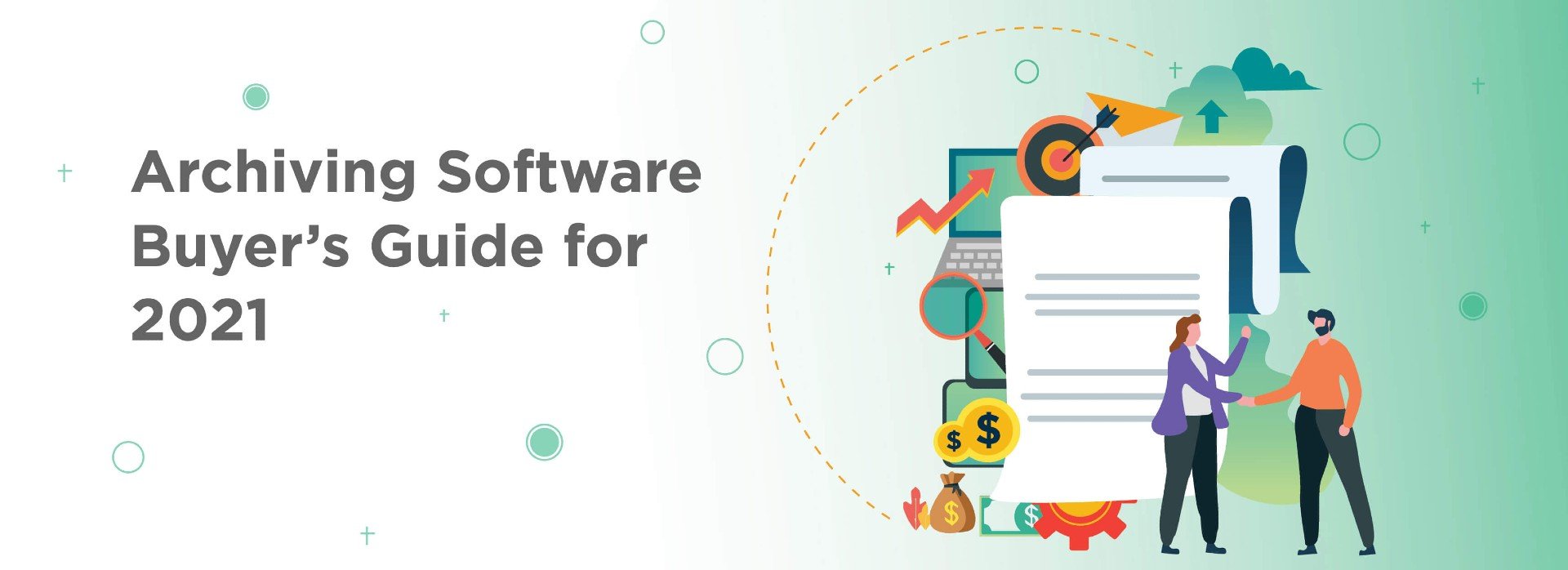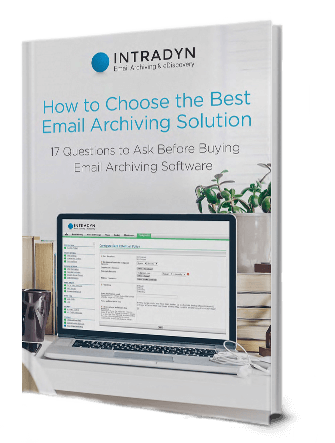Archiving Software Buyer’s Guide for 2021

From regulatory compliance to eDiscovery preparations, there are a wide variety of reasons why a business might invest in enterprise information archiving. In this buying guide, we’ll explain what, exactly, archiving software is and why data archiving is so important, as well as look at some of the leading archiving solutions on the market today.
What is Data Archiving?
Data archiving is the process by which inactive data is moved from primary storage to secondary storage — typically, archiving software — for long-term retention.
What is Archiving Software?
Archiving software broadly refers to any system or solution designed to store structured or unstructured data, such as images, messages and web content, in a secure digital archive. Certain archiving solutions are application-specific — that is, they’re dedicated to storing data in a specific file format, such as emails, social media messages, or text messages. Others serve as all-in-one enterprise information archiving platforms and are capable of storing data in any file format. Most archiving software is cloud-based, which allows for unlimited scalability and robust security.
Why is Archiving Software Important?
There are many reasons why an organization might seek out a software system for enterprise information archiving:
- Regulatory Compliance: Many regulations include specific language about data retention — for example, the Sarbanes-Oxley Act, which introduced reforms for existing securities regulations, requires all publicly traded companies to retain business records for a mandatory retention period of seven years.Failure to comply with relevant industry regulations and federal legislation can result in severe penalties, including fines and, in some cases, even jail time. Archiving software enables organizations to store business records and other important information for as long as needed, ensuring compliance.
- Electronic Discovery: From time to time, businesses may find themselves subject to litigation, governmental investigation or Freedom of Information Act requests, in which case they must make available all relevant data, including electronically stored information (ESI). Electronic discovery — eDiscovery, for short — refers to the process by which an organization locates, procures, reviews and exchanges ESI so that it may be used as evidence in civil or criminal legal proceedings.Archiving software makes it easier for organizations to respond to eDiscovery requests because it significantly reduces the risk of data loss (which can impede eDiscovery) and, thanks to its search capabilities, makes retrieving ESI fast and efficient.
- System Performance: Inactive data can place a major strain on production systems, diminishing performance, and overload primary storage. By routinely moving inactive data to secondary storage, such as an archive system, businesses can optimize system performance and ensure that primary storage is reserved for active data only.
- Readily Available Information: Many archiving solutions include some form of search capability, making it easy for employees to find the exact information they’re looking for amidst a sea of data. Truly advanced archiving systems will even use fuzzy logic to cover searches with typos and misspellings.
- Privacy & Security: Even though archiving software makes information readily available, it also ensures that information is kept secure. Certain archiving solutions enable businesses to set role-based permissions, set up end user authentication and redact sensitive information, so that important data doesn’t end up in the wrong hands.
- Backup & Disaster Recovery: Many archiving solutions include backup and disaster recovery functionality so that, in the event of unplanned downtime, businesses can safely restore data located in secondary storage.
What Key Features Should You Look for in an Archiving System?
Any organization in the market for an enterprise information archiving solution should look for a system with the following features and capabilities:
- Intuitive user interface
- Robust search functionality
- Advanced analytics and reporting
- Legal hold automation
- Message redaction
- Role-based permissions
- End user authentication
- Custom retention policies
- Data encryption
- Backup and disaster recovery capabilities
- Scalable cloud storage
- Flexible deployment options
Businesses that only need to archive certain file formats would do well to consider application-specific archiving software.
- For organizations that require email archiving, look for a system that supports IMAP and POP3 protocols, is compatible with major email servers (such as Exchange, Office 365 and Gmail) and can import PST files, historical email and raw email.
- For organizations that require social media archiving, look for a system that is compatible with all major social media platforms, time-stamps and digitally signs content to ensure tamper-proofing and uses invert index technology for indexing.
- For organizations that require text and SMS message archiving, look for a system that is compatible with all major service providers, allows for one-click content drilldown and can capture and reproduce messages in native and standard non-native formats.
How Much Do Archiving Solutions Typically Cost?
The cost of archiving software varies depending on the particular platform. Most archiving providers use some sort of tiered pricing structure based on the size of the business — determined by the total number of users — and the amount of data being archived.
Best Archiving Solutions for 2021
ArchiveManager
ArchiveManager, GRAU DATA’s archiving platform, combines HSM (Hierarchical Storage Management) and audit-proof archiving to create a fully compliant secondary storage system. Completely cloud-based, ArchiveManager boasts an integrated WORM system and is highly flexible and scalable. It’s even compatible with other archiving solutions, allowing for a truly comprehensive archiving infrastructure. Pricing for ArchiveManager is available on request; organizations without strict compliance-related requirements may want to consider OpenArchive, the free, open source version of ArchiveManager’s software.
ArchiveSocial
ArchiveSocial specializes in providing cloud-based social media archiving services to public entities to help ensure compliance with public records laws. ArchiveSocial captures and preserves content both from the entity itself and its constituents — including deleted, edited and hidden posts and comments — in their original context.
ArchiveSocial is compatible with most major social media platforms, including Facebook, Twitter, Instagram, YouTube and LinkedIn, and offers a number of features, including advanced search with filtering, near-real-time data capture and blocked list management. The company offers a three-tiered pricing plan: Economy for $249 per month; Standard for $399 per month; and Premium for $699 per month.
ArcTitan
ArcTitan is TitanHQ’s cloud-based email archiving solution for businesses, educators and managed service providers. ArcTitan natively integrates with Office 365, encrypts emails at rest and in transit to prevent data loss, allows for remote access to archived emails and more. Easy to use for admins and end users alike, ArcTitan is compliant with GDPR, HIPAA, SOX and other major regulations. Pricing for ArcTitan is available upon request, though organizations can get a free 30-day trial.
Barracuda Cloud Archiving Service
The Barracuda Cloud Archiving Service is, as its name implies, a secure cloud-based archiving system designed for eDiscovery and compliance purposes. It natively integrates with Office 365, Exchange and other major email services and includes a multi-functional add-in for Outlook, as well as mobile apps for Android and iOS. As far as features are concerned, the Barracuda Cloud Archiving Service includes granular retention, multilevel, role-based search with tagging, automated legal holds and audit trails. Barracuda Cloud Archiving Service is licensed on a per user subscription basis, starting at $3.99 per license.
Intradyn
Intradyn offers multiple archiving solutions, from application-specific platforms, such as an Email Archiver and Social Media Archiver, to an All-in-One Archiver capable of handling comprehensive enterprise information archiving. Each of Intradyn’s archiving systems offer a robust feature set, including advanced search functionality (with fuzzy logic), advanced analytics and reporting, backup and disaster recovery, granular retention policies and more.
Intradyn’s products cater to a wide variety of industries, including government, education, healthcare and financial services, and are highly scalable, making them ideal for small businesses and enterprises alike. They’re also compliant with most major regulations, including HIPAA, GDPR, FINRA and SOX. Intradyn also offers three deployment options — virtual, cloud-based and physical hardware — allowing for greater flexibility and enabling organizations to choose which option is right for them. Pricing for Intradyn is available upon request, though organizations can also get a 60-day free trial.
Jatheon Cloud
Jatheon Cloud is Jatheon’s cloud-based email archiving software (the company also offers an on-premise solution). Jatheon Cloud includes a wide variety of archiving capabilities, including advanced search, system monitoring, message tagging and legal holds, supports IMAP and POP3 and encrypts data at rest and in transit to prevent data loss. Given that it is cloud-based, Jatheon Cloud is highly scalable, meaning it’s capable of archiving emails at an enterprise-level scale. The company currently offers two pricing tiers for Jatheon Cloud based on total number of users: a Small and Midsize plan at $2.50 per user, per month and an Enterprise plan for 250+. Pricing for the Enterprise plan is available upon request.
Mimecast Cloud Archive
Cloud Archive is a multi-purpose cloud-based archiving system with advanced eDiscovery, compliance and legacy archive data management capabilities. Cloud Archive also features a Sync and Recover tool for backup and disaster recovery that enables organizations to ensure business continuity even in the event of an outage. Other key Cloud Archive capabilities include item- and mailbox-level legal holds, data visualizations and customizable reports, data encryption and activities logging. Designed with financial services firms in mind, Cloud Archive guarantees compliance with FINRA, SEC, FCA and other major FinServ industry regulations. Pricing for Mimecast Cloud Archive is available upon request.
Smarsh Connected Archive
Connected Archive, Smarsh’s archiving software suite, provides archiving services for enterprises and federal institutions. Each of the three solutions within the Connected Archive suite includes a number of compelling features and capabilities — for example, Enterprise Archive includes context preservation, granular retention policies, advanced search functionality and audit trails for compliance. Connected Archive’s solutions are immutable, WORM-compliant and leverage data encryption for security. Pricing for Connected Archive is available upon request.
Meet All of Your Enterprise Information Archiving Needs with Intradyn
If you want an all-in-one archiving solution that’s a cut above the rest, look no further than Intradyn. Not only does Intradyn offer all of the features discussed in this article, it comes backed by a team of archiving industry experts with a proven track record of continuous evolution and industry innovation.
With Intradyn, you can trust that even your most sensitive data is in good hands. Check out our free on-demand demo, or contact us today for more information.

